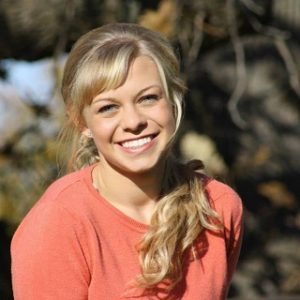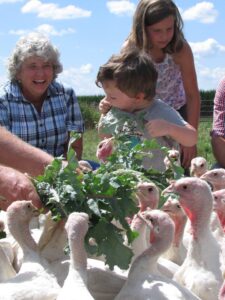Newhouse family works to preserve farmland
By Emily Hanlin
WINNEBAGO-BOONE FARM BUREAU AG COMMUNICATIONS
The Newhouse family, of Capron, has a true passion for agriculture.
Julie’s side of the family began farming in Winnebago in the mid 1800s, but her dad, Jim Cannell, moved to Boone County 68 years ago.
Jim Cannell, heavily involved with the Farm Bureau, became the first district IAA director from Boone County. Cannell started as a dairy farmer in Winnebago County but transitioned to beef cattle two years after moving to the original Boone County 200 acre farm.
In 1967, the family farm changed to a grain only operation. After Julie graduated with a degree in agronomy and married her husband, Marshall, they both farmed alongside her father until his passing in 2011.
Julie and Marshall still are actively involved with the farm, but are in the beginning stages of passing it down to their daughter Katie and her husband, Carl, and their two daughters, Evelyn and Julia.
Marshall and Julie spent their time in charge growing mainly crops. However, their children had the opportunity to raise beef, chickens, swine, and sheep as 4-H projects.
“When we got started farming, it was a time when everyone seemed to be getting out. Dairy herd buyouts were going on, the economic business of the 80s was occurring, and just the number of farmers that were dropping out was monumental,” Marshall Newhouse said. “It was a struggle to begin with but over the years, we have acquired some land, been able to rent other land and our little operation has grown.”
The Newhouses are thankful that all three children help on the farm, and one even decided to come back to the farm full time.
Katie and Carl had lived away from the family farm for 10 years. However, as their two children grew older, they wanted to give them life in a rural community and allow for them to be a part of agriculture. They came back to the family farm and now are putting Carl’s experience in computers and Katie’s degrees in chemistry and environmental science to use when it comes to stewardship and new agricultural practices.
“We are learning how to treat our land better and find ways to be profitable and sustainable,” Katie said.
The Newhouse farm looks very different than it did when Julie’s father was in charge. The family still grows various crops, but they have also picked up a tradition that started on Marshall’s side of the family years ago.
Marshall Newhouse’s family came to Boone County from Norway 150 years ago. They farmed livestock and grain. His father began raising 7,000 turkeys a year and sparked an interest in the whole family in niche markets and specialty crops.
“At almost 60, Marshall and I are beginning to challenge all the ways we grew up with,” Julie said.
The family has started to move forward and find ways to allow more families to be involved and make the land able to support more people. They have been experimenting with pastured poultry, transitioning some land into organic, and cover crops.
“When I got started, and my father-in-law had been in the business his whole life, he knew how he wanted things done,” Marshall said. “But, to invite a young whipper-snapper on with his ideas was a challenge at times. But, I was given the ability to make changes, and I did. So now, when I come back to this point, I have kids coming back to the farm and with the interest they have and the schooling they have gone through, I knew there was going to be an interest in looking at alternatives to what I have always done. That is why we began pursuing what is already a rolling trend in the agriculture industry of being better stewards. It has been an interesting experience the last couple of years to follow through with these new experiments.”
“Marshall and I are very humbled that Carl and Katie would leave steady pay checks and health insurance to come back and farm with us, and it is a huge blessing to have all three kids and their families so supportive of our farming operation,” Julie said.
The family is so close, since they have a motto to live by.
“You can’t just work and live in a community, you need to invest back into it,” Julie said. “Not only were we taught to be community volunteers and leaders, but we have an incredible responsibility to be good stewards of what the Lord has blessed us with, both the land and the water.”




